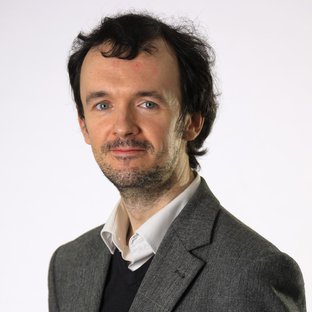
Dr Matthew Hosty
Biography
I studied here at St John’s for my undergraduate degree in Literae Humaniores, and then for my MSt and DPhil in Classics (although my supervisor for the DPhil was Dr Adrian Kelly of Balliol College). I spent three years as a lecturer, at Jesus College from 2013-15 and at Wadham College from 2015-16, before being elected to a Junior Research Fellowship at Merton College from 2016-19.
What inspired me to pursue this subject?
The heartwarming answer, which has the advantage of being partially true, is that my interest in Classics came from a picture-book retelling of the Odyssey I was given as a small child. More practically, though, it was starting Latin at secondary school that really made me think of Classics as an academic field I might enjoy pursuing, rather than just a general area of history I had an interest in; I enjoyed the way that Latin forced me to combine literary study, thinking about poems and stories and how they work, with the formal and technical rigour of verb tables and sentence structure. Twenty years later, I still value Classics for its alliance of precision to imagination. Studying Classics means studying people – how they thought, who they loved, what they ate and wore and wrote – but the vast gulf of time separating us from those people, and the paucity and fragility of the evidence they left behind, can only be bridged via careful, detailed, and empathetic analysis.
Research Interests
I specialise in the study of ancient literary parody, thinking about what ‘parody’ as a concept meant to the Greeks and Romans and how it manifested in their works as an artistic technique. Modern parody is a broad church, encompassing everything from very specific comic reworkings of popular texts (e.g. Weird Al Yankovic) to literary-theoretical attitudes of subversion and rejuvenation (e.g. Mikhail Bakhtin and the ‘carnivalesque’), and the roots of these ideas reach back into the Classical corpus – for example, did the Greeks and Romans think that parody needed to be funny? My doctoral thesis (since expanded into a monograph) was an edition with commentary of the Batrachomyomachia, one of the only surviving ancient texts to be labelled ‘parodic’ by modern scholars, and I am particularly interested in authors who employ parody as a strategy – e.g. Aristophanes, Lucian, Petronius. I also work on Greek hexameter epic, Hellenistic poetry (especially epigram), and textual criticism.
Teaching
At St John’s I primarily teach the Greek and Latin languages – translation, grammar, and prose composition. In previous jobs I have taught a wide range of literature papers, including Mods Iliad and Aeneid, Texts & Contexts, Greek and Latin Core, EGHP, Hellenistic Poetry, and Tragedy, and I still teach bits and pieces of these where needed. At the Classics Faculty, where I spend half of my time, I teach language classes for beginners.
I believe teaching is
the most important responsibility of the academic, and it is also the one I
find most satisfying: I love to teach at all levels, and get a real kick out of
watching students develop their understanding of a tricky topic, or have a
lightbulb moment where two different bits of knowledge suddenly combine to give
them a much bigger insight. And, of course, the ideas that my students come up
with often end up suggesting new possibilities or sending me down new avenues
in my own research!
Recent Publications
- Batrachomyomachia (Battle of the Frogs and Mice): Introduction, Text, Translation, and Commentary (Oxford, forthcoming March 2020) https://global.oup.com/academic/product/batrachomyomachia-battle-of-the-frogs-and-mice-9780198849902?cc=gb&lang=en&
- ‘“But who art thou?”: Callimachus and the Unsatisfactory Epitaph’, Greek, Roman, and Byzantine Studies 59 (2019), https://grbs.library.duke.edu/article/view/16202/7213
- ‘Schrödinger’s Mouse: liminality and the λίμνη in the Batrachomyomachia’, Journal of Hellenic Studies 137 (2017), https://www.cambridge.org/core/journals/journal-of-hellenic-studies/article/schrodingers-mouse-liminality-and-the-in-the-batrachomyomachia/D38BB1AA5BE7E32A84F8834A2BB10948#
- ‘Anonymous: The Battle of the Frogs and Mice’, The Literary Encyclopedia (first published Aug. 2016) https://www.litencyc.com/php/sworks.php?rec=true&UID=35729
- ‘The Mice of Ithaca: Homeric Models in the Batrachomyomachia’ (Mnemosyne 67, 2014)